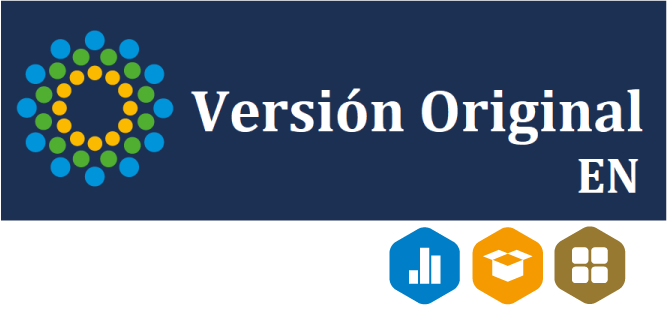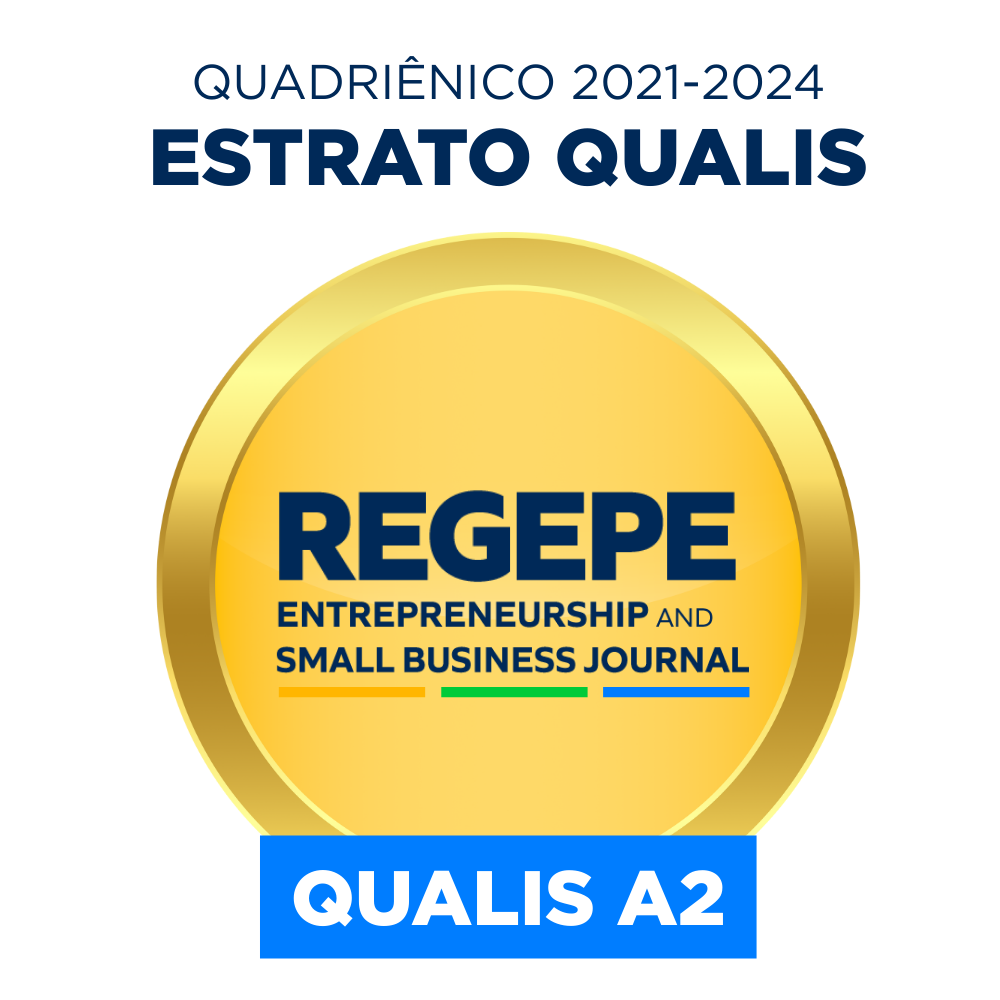Cuando las tensiones y las barreras destruyen las empresas de impacto social: Múltiples estudios de caso basados en la experiencia brasileña
DOI:
10.14211/regepe.esbj.e2528Palabras clave:
Negocios con impacto social, Empresas sociales, Muerte, Hibridación Organizacional, Tensiones, Barreras, Innovación SocialResumen
Objetivo: Este trabajo tuvo como objetivo comprender la muerte de los Negocios con Impacto Social (NIS) en Florianópolis en el período de 2017 a 2022, desde la perspectiva de los actores involucrados. Para ello, se estudiaron los proyectos SIB 1, SIB 2 y SIB 3. Metodología/enfoque: La investigación utiliza un enfoque cualitativo, con un sesgo exploratorio-descriptivo, basado en un estudio de casos múltiples. Los datos fueron sometidos a análisis temático, documental, descriptivo e interpretativo. Principales resultados: A partir de las tensiones y barreras expresadas en el campo, se identificaron cuatro razones relacionadas con la muerte de los NIS: (1) escasez de financistas en el campo socioambiental comercial; (2) desalineación de los actores de apoyo con el contexto local; (3) desequilibrio entre actividades socioambientales y comerciales; y (4) dificultad para definir un modelo de negocio sostenible. Contribuciones teóricas/metodológicas: Las razones de la muerte de los NIS están relacionadas con las tensiones y barreras identificadas en la literatura. A través de entrevistas con partes interesadas clave, se proporcionó un análisis detallado de los principales desafíos que involucran a los NIS. Relevancia/originalidad: La escasa existencia de investigaciones sobre la muerte de este tipo de empresas justifica la presente investigación y contribuye a la literatura y la práctica en el campo de las empresas sociales. Contribuciones sociales/de gestión: El estudio profundiza en los desafíos prácticos y contextuales que impactan a los NIS, ofreciendo insumos útiles para administradores, actores de apoyo e inversores.
Descargas
Citas
ACATE – Associação Catarinense de Tecnologia. (2023, 16 de junho). Home Page. https://www.acate.com.br
Agarwal, N., Chakrabarti, R., Brem, A., & Bocken, N. (2020). Managing dilemmas of resource mobilization through jugaad: A multi-method study of social enterprises in Indian healthcare. Strategic Entrepreneurship Journal, 14(3), 419–443. https://doi.org/10.1002/sej.1364
Alperstedt, G. D., Andion, C., & Pires, P. K. (2023). Dos empreendimentos sociais aos negócios de impacto: Examinando o debate teórico rumo à inovação social. REGEPE Entrepreneurship and Small Business Journal. https://doi.org/10.14211/regepe.e2214
Alvarenga, R. A. (2016). Study of the contributing factors to the mortality of micro and small enterprises in the state of Maranhão. International Journal of Innovation, 4(2), 106–118. https://doi.org/10.5585/iji.v4i2.36
Andrade, C. (2017). Why did we create the SGB Lab? Medium: Social Good Brasil. https://medium.com/@socialgoodbr/por-que-criamos-o-sgb-lab-8086ed0a33e2
Alter, K. (2007). Social enterprise typology. Virtue Ventures. https://isfcolombia.uniandes.edu.co/images/201519/LRD31.pdf
Barki, E. (2015). Negócios de impacto: Tendência ou modismo? Sociedade e Gestão, 14, 14–17.
Barki, E., Rodrigues, J., & Comini, G. M. (2020). Negócios de impacto: Um conceito em construção. Revista de Empreendedorismo e Gestão de Pequenas Empresas, 9(4), 477-501.
Battilana, J., Besharov, M., & Mitzinneck, B. (2018). On hybrids and hybrid organizing: A review and roadmap for future research. In R. Greenwood, C. Oliver, T. B. Lawrence, & R. E. Meyer (Eds.), The SAGE handbook of organizational institutionalism (2nd ed.). SAGE Publications Ltd. https://doi.org/10.4135/9781526415066
Battilana, J., & Lee, M. (2014). Advancing research on hybrid organizing - Insights from the study of social enterprises. Academy of Management Annals, 8(1), 397–441. https://doi.org/10.5465/19416520.2014.893615
Besharov, M. L., & Smith, W. K. (2014). Multiple institutional logics in organizations: Explaining their varied nature and implications. Academy of Management Review, 39(3), 364–381. http://dx.doi.org/10.5465/amr.2011.0431
Braun, V., & Clarke, V. (2006). Using thematic analysis in psychology. Qualitative Research in Psychology, 3(2), 77–101. http://dx.doi.org/10.1191/1478088706qp063oa
Bryman, A. (2012). Social research methods (4th ed.). Oxford University Press.
Byerly, R. T. (2015). The social contract, social enterprise, and business model innovation. Social Business, 4(4), 325–343. http://dx.doi.org/10.1362/204440814X14185703122883
Castellas, E. I., Stubbs, W., & Ambrosini, V. (2019). Responding to value pluralism in hybrid organizations. Journal of Business Ethics, 159(3), 635–650. https://doi.org/10.1007/s10551-018-3809-2
Caffrey, J. (2020, June). A profile of social enterprise and their stakeholder networks and engagement. Irish Social Business Campus (ISBC), 01-51.
Child, C. (2020). Whence paradox? Framing away the potential challenges of doing well by doing good in social enterprise organizations. Organization Studies, 41(8), 1147–1167. https://doi.org/10.1177/0170840619857467
Da Silva, L. C., da Silva Marinho, L. E., Rodrigues, M. G., & Andrade, J. D. N. T. (2023). Fatores condicionantes à mortalidade de MPE’s–Micro e Pequenas Empresas no Brasil. ID on line. Revista de Psicologia, 17(65), 141-149. https://doi.org/10.14295/idonline.v17i65.3690
Dees, J. G. (1998). Enterprising nonprofits. Harvard Business Review, 76(1), 54–67.
De Mon, I. A., Gabaldón, P., & Nuñez, M. (2022). Social entrepreneurs: Making sense of tensions through the application of alternative strategies of hybrid organizations. International Entrepreneurship and Management Journal, 18(2), 975–997. https://doi.org/10.1007/s11365-020-00731-5
Defourny, J., & Nyssens, M. (2017). Fundamentals for an international typology of social enterprise models. Voluntas, 28(6), 2469–2497. https://doi.org/10.1007/s11266-017-9884-7
Doherty, B., Haugh, H., & Lyon, F. (2014). Social enterprises as hybrid organizations: A review and research agenda. International Journal of Management Reviews, 16(4), 417–436. https://doi.org/10.1111/ijmr.12028
Ebrahim, A., Battilana, J., & Mair, J. (2014). The governance of social enterprises: Mission drift and accountability challenges in hybrid organizations. Research in Organizational Behavior, 34, 81–100. https://doi.org/10.1016/j.riob.2014.09.001
França Filho, G. C. de, Rigo, A. S., & Souza, W. J. de. (2020). A reconciliação entre o econômico e o social na noção de empresa social: Limites e possibilidades (no contexto brasileiro). Organizações & Sociedade, 27(94), 556–584. https://doi.org/10.1590/1984-9270948
Fundação CERTI. (2014). Sinapse da inovação: Estratégia catarinense na geração de empreendimentos inovadores. Fundação CERTI.
Garcia, F. T., Ten Caten, C. S., de Campos, E. A. R., Callegaro, A. M., & de Jesus Pacheco, D. A. (2022). Mortality risk factors in micro and small businesses: Systematic literature review and research agenda. Sustainability, 14(5), 2725.
Garrow, E. E., & Hasenfeld, Y. (2014). Social enterprises as an embodiment of a neoliberal welfare logic. American Behavioral Scientist, 58(11), 1475–1493. https://doi.org/10.1177/0002764214534674
Godoy, A. S. (1995). Pesquisa qualitativa: Tipos fundamentais. Revista de Administração de Empresas, 35(3), 20–29. https://doi.org/10.1590/S0034-75901995000300004
Hackett, M. T. (2016). Solving ‘social market failures’ with social enterprises? Grameen shakti (village energy) in Bangladesh. Journal of Social Entrepreneurship, 7(3), 312-341. https://doi.org/10.1080/19420676.2016.1188324
He, T., Liu, M. J., Phang, C. W., & Luo, J. (2022). Toward social enterprise sustainability: The role of digital hybridity. Technological Forecasting and Social Change, 175, 121360.
Hudson, R. (2009). Life on the edge: Navigating the competitive tensions between the "social" and the "economic" in the social economy and in its relations to the mainstream. Journal of Economic Geography, 9(4), 493–510. http://dx.doi.org/10.1093/jeg/lbp005
Jornada Amazônia. (n.d.). Home Page. Retrieved June 16, 2023, from https://jornadaamazonia.org.br/
Kraatz, M. S., Block, E. S., & Lounsbury, M. (2008). Organizational implications of institutional pluralism. In R. Greenwood, C. Oliver, R. Suddaby, & K. Sahlin-Andersson (Eds.), The SAGE handbook of organizational institutionalism (pp. 243-275). SAGE Publications Ltd.
Mair, J., & Martí, I. (2006). Social entrepreneurship research: A source of explanation, prediction, and delight. Journal of World Business, 41(1), 36–44. https://doi.org/10.1016/j.jwb.2005.09.002
Mackey, J., & Sisodia, R. (2013). Capitalismo consciente. HSM Editora.
OBISF – Observatório de Inovação Social de Florianópolis. (2022). Home Page. Universidade do Estado de Santa Catarina. https://observafloripa.com.br/
Martin, B., Walsh, L., Keating, A., Vyakarnam, S., & Shaw, E. (2024). The demise of a rising social enterprise for persons with disabilities: The ethics and the uncertainty of pure effectual logic when scaling up. Journal of Business Ethics, 191, 107–130. https://doi.org/10.1007/s10551-023-05390-4
Ometto, M. P., et al. (2019). From balancing missions to mission drift: The role of the institutional context, spaces, and compartmentalization in the scaling of social enterprises. Business & Society, 58(5), 1003–1046. http://dx.doi.org/10.1177/0007650318758329
Pel, B., Wittmayer, J., Dorland, J., & Jorgensen, M. S. (2018). Unpacking the social innovation ecosystem: A typology of empowering network constellations. In Annals of the 10th International Social Innovation Research Conference (ISIRC).
Petrini, M., Scherer, P., & Back, L. (2016). Business model with a social impact. RAE Revista de Administração de Empresas, 56(2), 209–225. http://dx.doi.org/10.1590/S0034-759020160207
Pires, P. K. (2021). A gramática do impacto: A figura complexa dos negócios de impacto no Brasil [Doctoral dissertation, Universidade do Estado de Santa Catarina]. http://sistemabu.udesc.br/pergamumweb/vinculos/000093/0000932a.pdf
Receita Federal. (n.d.). Home Page. Retrieved from https://www.gov.br/receitafederal/pt-br
Robinson, J. (2006). Navigating social and institutional barriers to markets: How social entrepreneurs identify and evaluate opportunities. In A. Nicholls (Ed.), Social entrepreneurship: New models of sustainable social change (pp. 202-230). Oxford University Press. https://doi.org/10.1057/9780230625655_7
Santos, F., Pache, A.-C., & Birkholz, C. (2015). Making hybrids work: Aligning business models and organizational design for social enterprises. California Management Review, 57(3), 36-58. https://doi.org/10.1525/cmr.2015.57.3.36
Sarhangi, R., Mashayekhi, A. N., & Souzanchi Kashani, E. (2021). From black and white to yin and yang: Exploring the management of tensions in social enterprises. Journal of Social Entrepreneurship. https://doi.org/10.1080/19420676.2021.1987970
Sebrae. (2014). Como definir o preço de venda de um produto ou serviço. Artigos. https://sebrae.com.br/sites/PortalSebrae/artigos/como-definir-o-preco-de-venda-de-um-produt o-ou-servico,cc9836627a963410VgnVCM1000003b74010aRCRD
Shaw, E., & Bruin, A. (2013). Reconsidering capitalism: The promise of social innovation and social entrepreneurship? International Small Business Journal, 31(7), 737–746. https://doi.org/10.1177/0266242613497494
Smith, W. K., Gonin, M., & Besharov, M. L. (2013). Managing social-business tensions: A review and research agenda for social enterprise. Business Ethics Quarterly, 23(3), 407–442. https://doi.org/10.1177/0266242613497494
Smith, W. K., & Lewis, M. W. (2011). Toward a theory of paradox: A dynamic equilibrium model of organizing. Academy of Management Review, 36(2), 392-414. https://doi.org/10.5465/AMR.2011.59330958
Sroka, W., & Meyer, N. (2021). A theoretical analysis of social entrepreneurship: The case of Poland and South Africa. Journal of Eastern European and Central Asian Research, 8(1), 133–148. https://doi.org/10.15549/jeecar.v8i1.596
Stevens, R., Moray, N., & Bruneel, J. (2015). The social and economic mission of social enterprises: Dimensions, measurement, validation, and relation. Entrepreneurship: Theory and Practice, 39(5), 1051–1082. https://doi.org/10.1111/etap.12091
Vázquez-Maguirre, M., & Portales, L. (2018). Profits and purpose: Organizational tensions in indigenous social enterprises. Intangible Capital, 14(4), 604–618. https://doi.org/10.3926/ic.1208
Young, D. R., & Lecy, J. D. (2014). Defining the universe of social enterprise: Competing metaphors. Voluntas, 25(5), 1307–1332. https://doi.org/10.1007/s11266-013-9396-z

Publicado
Métricas
Visualizações do artigo: 1827 PDF (English) downloads: 234 Audio (English) downloads: 20 Video (English) downloads: 28 XML (English) downloads: 0 Peer review report (English) downloads: 71
Cómo citar
Número
Sección
Licencia
Derechos de autor 2025 Maryane Cristina de Souza Crestani, Graziela Dias Alperstedt, Helena Kuerten de Salles

Esta obra está bajo una licencia internacional Creative Commons Atribución 4.0.
Los autores que publican en esta revista están de acuerdo con los siguientes términos:
-
El/La autor(a)/es(as) autorizan la publicación del texto en la revista;
-
La revista no se responsabiliza de las opiniones, ideas y conceptos emitidos en los textos, ya que son de entera responsabilidad de sus autores/autoras;
-
Los autores/autoras mantienen los derechos de autor y conceden a la revista el derecho de la primera publicación, con el trabajo publicado bajo la Licencia CC BY 4.0
, que permite el compartir el trabajo con reconocimiento de la autoría y la publicación inicial en esta revista;
-
Los autores/autoras están permitidos y animados a publicar su trabajo (Versión enviada, Versión aceptada [Manuscrito aceptado por el autor/autora] o Versión publicada [Versión del registro]) en línea, por ejemplo, en repositorios institucionales o preprints, ya que puede llevar a intercambios productivos, así como a citas anteriores y mayores de trabajos publicados. REGEPE pide como condición política para los autores/autoras que indiquen/vinculen el artículo publicado con DOI. Vea el Efecto del Acceso Abierto.
Datos de los fondos
-
Fundação de Amparo à Pesquisa e Inovação do Estado de Santa Catarina
Números de la subvención TO 2023TR000553 -
Conselho Nacional de Desenvolvimento Científico e Tecnológico
Números de la subvención 403185/2021-1















